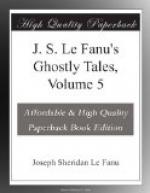One wintry morning, nearly a year and a half after his disappearance, their mother having set out for Limerick soon after cockcrow, to sell some fowls at the market, the little girl, lying by the side of her elder sister, who was fast asleep, just at the grey of the morning heard the latch lifted softly, and saw little Billy enter and close the door gently after him. There was light enough to see that he was barefoot and ragged, and looked pale and famished. He went straight to the fire, and cowered over the turf embers, and rubbed his hands slowly, and seemed to shiver as he gathered the smouldering turf together.
The little girl clutched her sister in terror and whispered, “Waken, Nelly, waken; here’s Billy come back!”
Nelly slept soundly on, but the little boy, whose hands were extended close over the coals, turned and looked toward the bed, it seemed to her, in fear, and she saw the glare of the embers reflected on his thin cheek as he turned toward her. He rose and went, on tiptoe, quickly to the door, in silence, and let himself out as softly as he had come in.
After that, the little boy was never seen any more by any one of his kindred.
“Fairy doctors,” as the dealers in the preternatural, who in such cases were called in, are termed, did all that in them lay—but in vain. Father Tom came down, and tried what holier rites could do, but equally without result. So little Billy was dead to mother, brother, and sisters; but no grave received him. Others whom affection cherished, lay in holy ground, in the old churchyard of Abington, with headstone to mark the spot over which the survivor might kneel and say a kind prayer for the peace of the departed soul. But there was no landmark to show where little Billy was hidden from their loving eyes, unless it was in the old hill of Lisnavoura, that cast its long shadow at sunset before the cabin-door; or that, white and filmy in the moonlight, in later years, would occupy his brother’s gaze as he returned from fair or market, and draw from him a sigh and a prayer for the little brother he had lost so long ago, and was never to see again.
STORIES OF LOUGH GUIR
When the present writer was a boy of twelve or thirteen, he first made the acquaintance of Miss Anne Baily, of Lough Guir, in the county of Limerick. She and her sister were the last representatives at that place, of an extremely good old name in the county. They were both what is termed “old maids,” and at that time past sixty. But never were old ladies more hospitable, lively, and kind, especially to young people. They were both remarkably agreeable and clever. Like all old county ladies of their time, they were great genealogists, and could recount the origin, generations, and intermarriages, of every county family of note.
These ladies were visited at their house at Lough Guir by Mr. Crofton Croker; and are, I think, mentioned, by name, in the second series of his fairy legends; the series in which (probably communicated by Miss Anne Baily), he recounts some of the picturesque traditions of those beautiful lakes—lakes, I should no longer say, for the smaller and prettier has since been drained, and gave up from its depths some long lost and very interesting relics.




